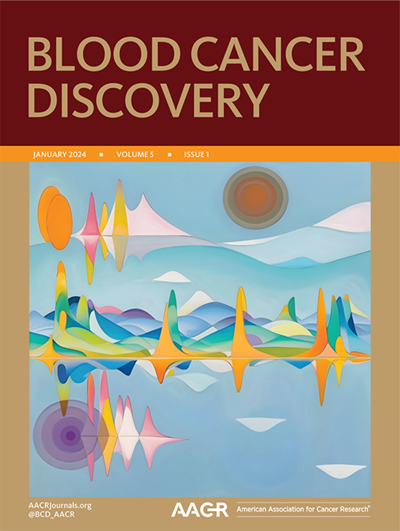SOCS1 Protects Acute Myeloid Leukemia against Allogeneic T Cell-Mediated Cytotoxicity.
IF 11.5
Q1 HEMATOLOGY
引用次数: 0
Abstract
Significance: Our investigation of the SOCS1 pathway in AML and T-cell interactions provides insights into potential mechanisms of resistance of AML to allogeneic hematopoietic stem cell transplantation and demonstrates the potential of targeting SOCS1 and its downstream mediators to enhance antileukemic T-cell activity. See related commentary by Fry, p. 157.
SOCS1 可保护急性髓性白血病免受异体 T 细胞介导的细胞毒性的影响。
尽管同种异体造血干细胞移植治疗急性髓性白血病(AML)具有潜力,但其疗效受到癌细胞对供体来源的t细胞毒性的内在抗性的限制。使用全基因组CRISPR筛选,我们发现SOCS1-JAK1-STAT1通路是AML对T细胞易感性的中介。AML细胞中SOCS1的敲低使它们对同种异体T细胞的杀伤敏感,而AML细胞中SOCS1的过表达诱导了对T细胞抗白血病活性的抵抗。机制上,SOCS1通过拮抗ifn γ- jak1诱导的ICAM-1表达,保护AML细胞免受t细胞杀伤。此外,SOCS1表达较低的原发AML细胞与患者的总生存率相关,特别是那些CD8+ t细胞耗竭评分较低的患者。因此,本研究揭示了SOCS1及其下游介质作为一种潜在的靶向途径,可以增强基于T细胞的AML免疫治疗。
本文章由计算机程序翻译,如有差异,请以英文原文为准。
求助全文
约1分钟内获得全文
求助全文
来源期刊

Blood Cancer Discovery
Multiple-
CiteScore
12.70
自引率
1.80%
发文量
139
期刊介绍:
The journal Blood Cancer Discovery publishes high-quality Research Articles and Briefs that focus on major advances in basic, translational, and clinical research of leukemia, lymphoma, myeloma, and associated diseases. The topics covered include molecular and cellular features of pathogenesis, therapy response and relapse, transcriptional circuits, stem cells, differentiation, microenvironment, metabolism, immunity, mutagenesis, and clonal evolution. These subjects are investigated in both animal disease models and high-dimensional clinical data landscapes.
The journal also welcomes submissions on new pharmacological, biological, and living cell therapies, as well as new diagnostic tools. They are interested in prognostic, diagnostic, and pharmacodynamic biomarkers, and computational and machine learning approaches to personalized medicine. The scope of submissions ranges from preclinical proof of concept to clinical trials and real-world evidence.
Blood Cancer Discovery serves as a forum for diverse ideas that shape future research directions in hematooncology. In addition to Research Articles and Briefs, the journal also publishes Reviews, Perspectives, and Commentaries on topics of broad interest in the field.
 求助内容:
求助内容: 应助结果提醒方式:
应助结果提醒方式:


